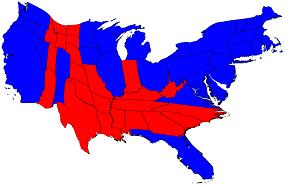A week ago, we as a nation were set to decide several important political outcomes. A week later, those outcomes are decided, with the clearest message of all being that Evangelical Christians were repudiated convincingly at the polls. Whatever hubris existed in that voting bloc at the time of the 2000 elections has been wiped away, possibly forever, in the wake of the elections of 2012.
I wrote some initial thoughts on the 2012 election last week (“The 2012 Election Results and What They Mean for ‘Evangelical Christian America'”), but I wanted to throw out more musings and questions for those of us who are Bible-believing Christians who vote conservative.
- Rod Dreher may have prophesied when he addressed the same-sex marriage issue. Absolutely read this: “SSM, Social Conservatives, & The Future.” The gist of Dreher’s contention is that social conservatives (Christian, in particular), have lost the battle against same-sex marriage (and other “traditional values” issues). He believes this will force the Republican Party to move center-left if it wants to compete politically. I believe Dreher is correct, which means a GOP/Evangelical divorce in the future or a weakening of Evangelicals on issues of abortion, same-sex marriage, and so on—and possibly both.

2012 Electoral Vote Map Adjusted for Population
While the election was close by popular vote, it was not by electoral college vote. Not only this, but it shows a country divided by the following:
Urban vs. Suburban/Rural
All Other Races vs. Whites
Women vs. Men
Younger vs. Older
Liberal vs. Conservative
In every pairing, the group on the left sided with the majority of winners.
- The vote of women decided this election, for the most part (but see below). And with the popular vote in four states approving same-sex marriage, it raises the question of whether women, as a whole, are less negative concerning lesbianism as men are of male homosexuality. It would appear so. (Witness the election of lesbian Tammy Baldwin of Wisconsin to the Senate, for instance.) In addition, this outcome begs for clarification on whether women are more likely to desire same-sex marriage for themselves than men are. If so, the only way to prevent further erosion of traditional family values is to appeal to women.
- One “truth” we are always told is that Hispanic and Asian cultures are both strongly pro-family, largely allying with Evangelicals in rejecting the liberal social reconstruction agenda. The results from Election 2012 violate that supposed bromide. The question is whether the strong support Barack Obama received is the prioritization among Hispanics and Asians of a racial minority mindset over conservative family values. Further research on this issue is necessary, because the liberal social reconstruction agenda those two groups assented to has not been adopted by the GOP—yet. If Hispanics and Asians are voting for a candidate primarily because they identify with that candidate as a fellow minority, then race is moving to the forefront of politics again, trumping any other social agenda.
- In that same vein, if the GOP had managed to snag just 10-15 percent of the Asian and Hispanic vote that otherwise went to the Democrats, the outcome of this election may have been dramatically different.
- For all the talk from Evangelical pastors of black congregations who were incensed at the Obama administration’s wholesale attack on values those churches hold dear , they were totally ineffective at swaying their congregations to vote to support those values and reject the current administration’s finagling. One must also look at the Roman Catholic vote, in that RC leadership leans GOP, while the congregants themselves seem devoted to the Democratic cause. This divorce only highlights an increasingly obvious truth: Leaders of “conservative” churches are far more conservative than are their congregations, and their own hubris causes them to overestimate their influence on the folks in their churches.
- Stats show Mitt Romney pulled more votes from conservative Christians than any GOP candidate on record, nearly 80 percent of self-identified Evangelicals. In addition, few Evangelicals voted for third party candidates. Obviously, Evangelicals worried more about the policies of Barack Obama than were troubled by Romney’s Mormonism. This is a disturbing trend since it seems that Evangelicals will vote politics above theological truth. Regardless of where you stand on Last Days theology, Christians who downgrade heresy are setting themselves up to side with future leaders of questionable doctrine, all in the name of political promises. Obviously, few are reading the Book of Revelation.
- Those of us who voted third party or for write-ins saw one of the worst showings ever for such candidates. However, if the GOP does move center-left on social issues (see above), Evangelical Christians will be stuck. Yet imagine a scenario where a new political party united by Christian belief challenged the Democrats and Republicans. It’s not hard to believe that a less Evangelical GOP could draw off some Democratic voters, while a Christian-leaning party would give the two other parties a serious run. Perhaps, though, it is impossible due to too much factionalism within Evangelicalism to create a political party favorable to its causes. Still, should the GOP move center-left as I believe it will, a competitive third party based on the beliefs the GOP is soon to repudiate might actual make some inroads and win a few elections. I mean, Maine elected an independent senator, so it’s possible.
Those are my additional thoughts. What do you think about the above or about other issues pertaining to the future we conservative Christians now face?
